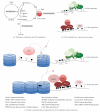T2DM: Why Epigenetics?
- PMID: 22132323
- PMCID: PMC3216274
- DOI: 10.1155/2011/647514
T2DM: Why Epigenetics?
Abstract
Type 2 Diabetes Mellitus (T2DM) is a metabolic disorder influenced by interactions between genetic and environmental factors. Epigenetics conveys specific environmental influences into phenotypic traits through a variety of mechanisms that are often installed in early life, then persist in differentiated tissues with the power to modulate the expression of many genes, although undergoing time-dependent alterations. There is still no evidence that epigenetics contributes significantly to the causes or transmission of T2DM from one generation to another, thus, to the current environment-driven epidemics, but it has become so likely, as pointed out in this paper, that one can expect an efflorescence of epigenetic knowledge about T2DM in times to come.
Figures
References
-
- Ramachandran A, Ma RCW, Snehalatha C. Diabetes in Asia. The Lancet. 2010;375(9712):408–418. - PubMed
-
- Schmalhausen I. Factors of Evolution. Philadelphia, Pa, USA: Blakiston; 1949.
-
- Waddington CH. The epigenotype. Endeavour. 1942;1:18–20.
-
- Holliday R. Epigenetics: an overview. Developmental Genetics. 1994;15(6):453–457. - PubMed
-
- Russo VEA. Epigenetic Mechanisms of Gene Regulation. Cold Spring Harbor Laboratory Press; 1996.
LinkOut - more resources
Full Text Sources


